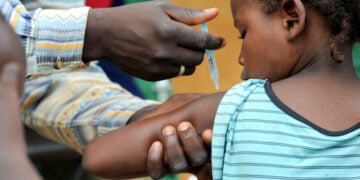As the world marks World Breastfeeding Week from August 1–7, a renewed spotlight is being placed on one of the most natural and essential acts for a child’s survival; breastfeeding.
With this year’s theme, “Prioritise Breastfeeding: Create Sustainable Support Systems,” UNICEF has expressed concern over Nigeria’s stagnating breastfeeding rates and urging collective action to reverse the trend.
Despite widespread awareness campaigns and decades of health advocacy, many Nigerian mothers still face barriers to exclusive and sustained breastfeeding.
The National Demographic and Health Survey (NDHS 2023-24) revealed that early initiation of breastfeeding within the first hour after birth has declined from 42 per cent in 2018 to 36 per cent in 2023. Even more concerning, the rate of exclusive breastfeeding (feeding babies only breast milk for the first six months) has stalled at 29 per cent. Only 23 per cent of Nigerian babies are breastfed up to the recommended two years.
These numbers represent missed opportunities for children to get the best possible start in life and for mothers to experience the full health benefits of breastfeeding.
According to UNICEF, breast milk is a powerhouse of nutrition. It contains all the nutrients an infant needs in the first six months of life, along with vital antibodies that help babies fight infections.
Research shows that breastfed children perform better on intelligence tests and are less likely to become overweight or obese later in life. For mothers, breastfeeding reduces the risk of breast and ovarian cancers, and Type II diabetes.
UNICEF Nigeria country representative, Wafaa Saeed Abdelatef, said “Breast milk is central to child survival and development. We all have a role to play in supporting mothers to breastfeed effectively.
“This World Breastfeeding Week, we urge every level of government, every workplace, and every community to build lasting support systems so that no mother lacks the encouragement or resources she needs. Let us mark this week not just with words, but with action.”
According to nutritionists, the benefits of breastfeeding go beyond health. Breastfeeding is a climate-smart solution. It’s sustainable, cost-effective, and zero-waste. In a world grappling with environmental degradation and rising food insecurity, breast milk stands out as a free, readily available, and eco-friendly source of nutrition, yet one that is still not fully supported.
One of the most glaring barriers is the lack of paid maternity leave. Out of Nigeria’s 36 states and the Federal Capital Territory, only 12 provide up to six months of paid leave, a period critical for establishing exclusive breastfeeding.
For women in the informal sector or low-income households, the challenge is even steeper. With no job security, minimal workplace support, and limited access to health facilities that offer breastfeeding counseling, many mothers simply cannot afford to breastfeed exclusively.
In healthcare settings, not all providers are trained to support or counsel mothers effectively, while cultural myths and misinformation continue to influence decisions around infant feeding.
To change this narrative, UNICEF said it is crucial that mothers receive support, whether at home, in healthcare settings, or workplaces, to initiate breastfeeding within the first hour of birth, breastfeed exclusively for six months, and continue alongside nutritious complementary foods up to breastfeed their babies for at least for 24 months.
To tackle the problem head-on, UNICEF and the federal government, through the Nutrition 774 Initiative, are calling for concrete action. This includes six months paid maternity leave across all states, training of health workers to provide better breastfeeding counseling and support.
Others are workplace breastfeeding-friendly policies, including nursing rooms and flexible hours, community sensitisation to dispel myths and normalise breastfeeding in public and increased investment in nutrition programmes that prioritise early childhood health.
The push for sustainable breastfeeding support is not just a health issue, it’s a development strategy. Countries that invest in early nutrition see returns in better educational outcomes, reduced healthcare costs, and a stronger, more productive workforce.
World Breastfeeding Week is more than a celebration, it’s a wake-up call. While over 90 per cent of Nigerian mothers start breastfeeding, far fewer are able to sustain it in the way their babies need most.
As the week unfolds, stakeholders from government ministries to local communities are urged to take real steps to protect the right of every child to adequate nutrition. The question is no longer why breastfeeding matters, but how Nigeria will rise to the challenge of making it work for every mother and every child.





